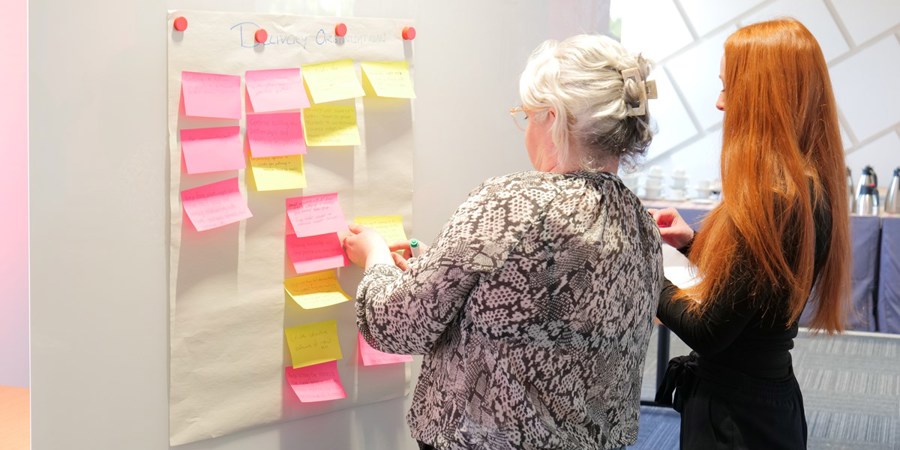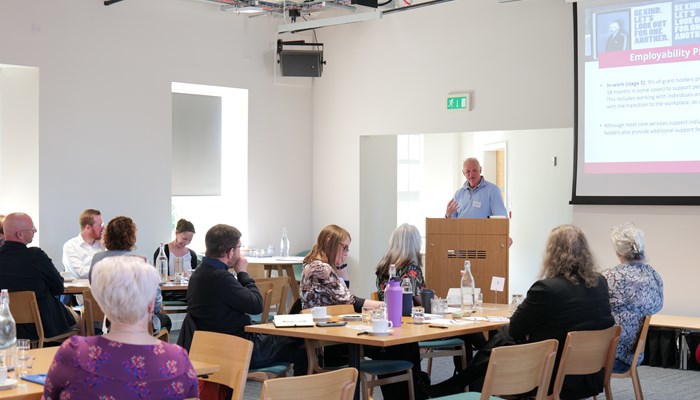"Our Impact and Insights Framework will be underpinned by principles of proportionality in terms of what we ask for from grant holders, our commitment to open and trusting grant making, and an understanding of impact being about contribution, not attribution."
Cassy Rutherford, Learning and Communications Manager

Funders gather a lot of information and learning from grant holders - but how do we use it well? In this blog, our Learning and Communications Manager, Cassy Rutherford, introduces our Impact and Insights framework.
Like many funders, we have been grappling with the question about how we use the information and learning we gather from grant holders in a way that is both useful to them and us.
We have found ways to do this effectively within individual projects and within programmes, but as we try to draw out insights across multiple projects, the harder it becomes.
Our mission and commitment to learning
We are half-way through our 10-year strategy, and we have a clear mission: to prevent and reduce poverty and trauma in Scotland, by funding, supporting, and influencing solutions to drive social change. When we developed our strategy, we committed to being a learning organisation. For us, this meant that we would use different sources of evidence – internal and external – to understand what differences we were contributing to, and to make evidence-informed decisions about where we should target our resources to have as big an impact as possible.
Developing our Impact and Insights Framework
Over the last three-year delivery plan years, we have been developing, testing and refining approaches to gathering and using learning across different areas of the Trust and in December 2024, our Board approved an Impact and Insights Framework (IIF). This gives us a clear structure and tools to understand:
- What differences we are making as a funder.
- What differences our grant holders are contributing to.
- What our contribution is towards broader social change.
This will be underpinned by principles of proportionality in terms of what we ask for from grant holders, our commitment to open and trusting grant making, and an understanding of impact being about contribution, not attribution.
We will be using the learning we generate to inform our own work, including where we target our resources across our three objectives to fund, support and influence.
Last summer, we published an impact report which was our first test for the Framework we were developing. In it, we tried to summarise what we were seeing in terms of impact across our own activities and the partners and grant holders we support.
At any one time, we have approximately 1,000 live grants which range from Wee Grants of a minimum of £500 for one year to Programme Awards which can be up to a maximum of £500K over five years. These awards are all trying to deliver change at different levels within at least one of our four priority themes. When we tried to produce an Impact Report that covered all of those at the same time – as well as including our commitments to addressing climate change and Equality, Diversity, Participation and Rights (EDPR) – we found it difficult to produce insights that were tangible and specific enough to be actionable in a meaningful way.
Deepening our learning with theme-based reviews
We have learned from this and refined our approach. Through our IIF, we now focus on a quarterly deep dive into each of our themes. This will explore:
- What we fund within that theme.
- What the external context is for organisations, and individuals and communities.
- What is coming down the tracks in terms of policy or legislative developments that might impact on the work we support.
- What we are learning about impact and how differences are being made.
- What that means for what we do next (with the ‘we’ being delivery organisations, ourselves as a funder, and the broader system).
We will answer these questions by reviewing external data, analysing a sample of the awards we have made through that theme, and a collective sense-making sense session. These events will bring together grant holders, academics, policy makers, practitioners, Trust staff and trustees, and experts by experience. The aim will be to sense-check emerging findings and to consider implications for what we do next.

What we’ve learned so far
We are really excited to share our first go at this cycle through our Financial Security Impact and Insights report. Through it, we’ve focused on what we’re learning about money advice services. This report starts to tell the story about the differences we are contributing to as we seek to prevent and reduce poverty and trauma in Scotland.
Each quarter, we will be building on our approach to keep refining the processes, the outputs, and the conversations we generate around them. Our upcoming deep dive will focus on our Work Pathways theme, and we look forward to sharing our insights and reflections in due course.
